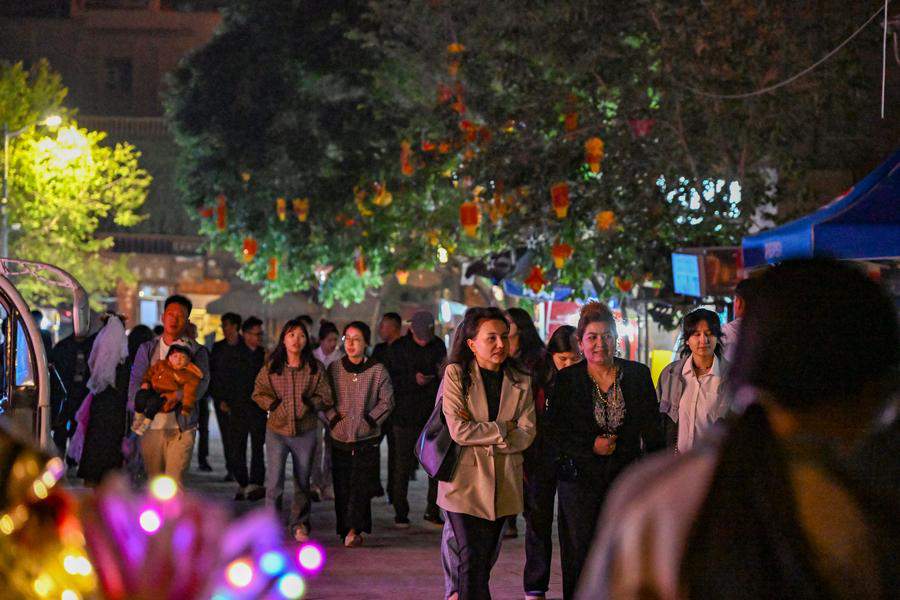Xinjiang thrives despite costly U.S. mud-slinging offensive

An aerial drone photo taken on April 18, 2024 shows a view of the load-transfer yard of Horgos railway port in Horgos, northwest China's Xinjiang Uygur Autonomous Region. (Xinhua/Chen Shuo)
* With a population of 25.8 million, Xinjiang received 265 million domestic and foreign tourists in 2023, raking in 296.7 billion yuan (about 42 billion U.S. dollars) in tourism revenue, double the visitors' spending Hawaii garnered in the same year.
* Washington's unfounded accusations as forced labor, oppression of minorities, and even genocide are nothing but a laughing stock, but for purposes obvious to all, Washington has kept splurging millions of tax dollars every year on those false narratives.
URUMQI, Aug. 29 (Xinhua) -- Northwest China's Xinjiang Uygur Autonomous Region is embracing yet another booming tourism season, with popular attractions such as the Old Town of Kashgar and the Grand Bazaar in Urumqi bustling with visitors from both home and abroad.
With a population of 25.8 million, Xinjiang received 265 million domestic and foreign tourists in 2023, raking in 296.7 billion yuan (about 42 billion U.S. dollars) in tourism revenue, double the visitors' spending Hawaii garnered in the same year.
The flourishing tourism sector is just one aspect of Xinjiang's dynamic social and economic development, which is unfolding in defiance of the vehement smear campaign the United States has launched against Xinjiang at the expense of American taxpayers.

Travelers from Kazakhstan enter the China-Kazakhstan Horgos International Border Cooperation Center in Horgos, northwest China's Xinjiang Uygur Autonomous Region, April 19, 2024. (Xinhua/Chen Shuo)
REAL DOLLARS FOR FALSE NARRATIVES
In what is widely considered a giveaway of Washington's machinations, Lawrence Wilkerson, chief of staff to former U.S. Secretary of State Colin Powell, hinted in a 2018 speech at using the Uygur autonomous region to destabilize China.
To the people in Xinjiang, such a scheme would be too delusional. Yet Washington has clearly raised its bet on Xinjiang in recent years in a bid to contain China, and one of its first plots was to launch a frenzied smear campaign against the region.
Such unfounded accusations as forced labor, oppression of minorities, and even genocide are nothing but a laughing stock, but for purposes obvious to all, Washington has kept splurging millions of tax dollars every year on those false narratives.
For example, the National Endowment for Democracy (NED), primarily funded by the U.S. Congress, provides millions of dollars every year to support anti-China, separatist Uygur organizations. Among them is the notorious "World Uyghur Congress," whose head, Dolkun Isa, was caught up in a sex scandal involving a 22-year-old Turkish-Belgian university student and forced to resign temporarily earlier this year. In the past few months, he has been spotted in Switzerland, Bosnia and Herzegovina, and the United States, and his clothes suggest no shortage of funds.
According to the NED website, the NED's grants to different Uygur "human rights advocacy" projects totaled 2.58 million dollars in 2021. The webpage listing previous grants is "under construction," and the numbers for 2022 and 2023 are not available. On its website, the NED claims to be the only institutional funder of so-called Uygur advocacy organizations, awarding 8,758,300 dollars to Uygur groups from 2004 to 2020.
But rumor-mongering machines are not the only thing U.S. taxpayers are paying for; they are also paying for the higher prices of many goods caused by ill-founded U.S. sanctions, including those imposed according to the so-called "Uyghur Forced Labor Prevention Act" (UFLPA).
For example, China's solar panels are 20 percent to 40 percent cheaper than their U.S. counterparts. Unfortunately, the United States blocks imports from Chinese solar panel companies, not only leading to higher costs for those importers but further complicating the country's efforts to achieve its renewable energy goals.
As businesses on the UFLPA entity list are involved in a wide range of areas, such as apparel, agriculture, polysilicon, plastics, chemicals, batteries, and household appliances, the overall impact on U.S. manufacturers and consumers is likely to be extensive.

Tourists visit the Old Town of Kashgar in northwest China's Xinjiang Uygur Autonomous Region, April 30, 2024. (Xinhua/Chen Shuo)
TRANSLATE DISADVANTAGES INTO MOTIVATIONS
Meanwhile, there is no evidence that the U.S. sanctions have dealt any serious blow to Xinjiang's social and economic development.
The region's gross domestic product (GDP) registered a growth rate of 6.8 percent in 2023, the first full year the UFLPA was implemented after being enacted in late 2021 and taking effect in June 2022. The per capita disposable income reached 28,947 yuan (about 4,063 dollars), up 7 percent year on year.
As many foreign vloggers have shown the world during their trips to different places in Xinjiang, the local society is as prosperous as it is stable and harmonious, and the Xinjiang people, including the Uygurs and other ethnic minority groups, are all living a better life.
As regards the sanctioned entities, the export restrictions have indeed caused some headwinds, but the companies are holding up, and none of them have gone bankrupt. Their products are either consumed by China's vast domestic market or exported to other countries. Losing the U.S. market might be regrettable, but not fatal.
For example, a silicon manufacturer Xinhua visited last week, which prefers to remain unnamed for fear of further U.S. sanctions, has been striving to extend production chains and upgrade technologies to make their products more competitive. They have not laid off a single employee in the past two years, and their revenue has remained stable.
In a reflection of the traditional Chinese philosophy of turning disadvantages into advantages, an executive of that enterprise told Xinhua that the company believes strengthening its capabilities is the only way to survive and succeed in a fiercely competitive environment after being excluded from the U.S. market.
Indeed, Xinjiang is forging ahead with resilience and confidence. It has announced its development goals for this year, which include a 6.5-percent GDP growth, as well as a 6.5-percent and 7.5-percent growth for the per capita disposable income of urban and rural residents, respectively.
Should Washington continue with its costly mud-slinging offensive against Xinjiang, it would only result in more U.S. tax dollars being wasted on a futile cause.
Photos
Related Stories
- Numbers show Xinjiang's rapid development
- Xinjiang Story: Armed with novel tools, new generations become guardians of millennium-old city ruins
- Wondrous Xinjiang: Xinjiang city wows tourists with delicious grapes, rich culture
- Xinjiang launches first folk art season
- Xinjiang sees over 10,000 China-Europe freight trains this year
Copyright © 2024 People's Daily Online. All Rights Reserved.









